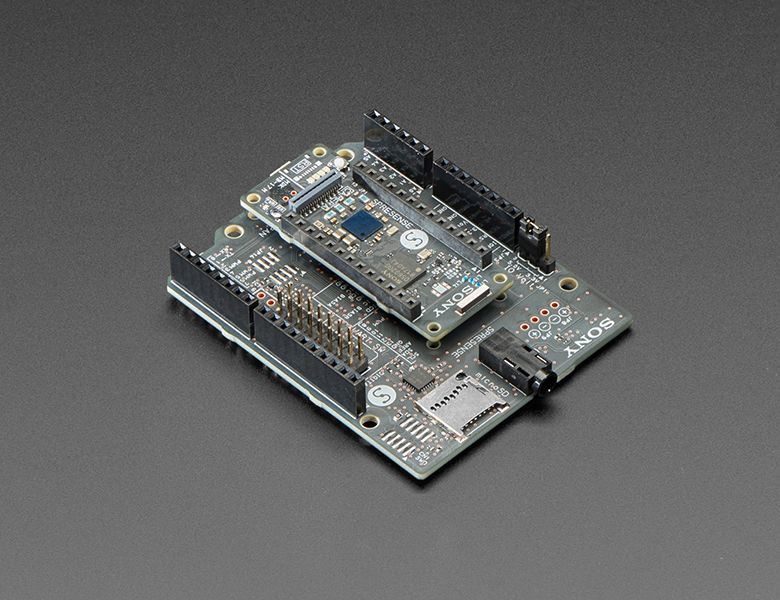Spresense
by Sony

The Spresense project consists of a Arduino compatible board with Sony’s high performance CXD5602 micro-controller. The CXD5602 has built-in GPS and high-resolution audio capabilities.
The main board uses a processor developed by Sony for IoT and sensing applications. The main board can be operated alone or with the extension board.
The Spresense uses Sony’s new chipset on the main board:
- The CXD5602 System on Chip (SoC) multi core processor with GNSS
- The CXD5247 power management and audio analog interface chip
The Spresense extension board is a board which extends the interfaces compared to the Spresense main board. The Spresense main board and the Spresense extension board are connected by a Board-to-Board (B-2-B) connector. The Spresense extension board has Arduino Uno pin compatible shape and pin socket locations. However, there are some differences compared to the Arduino Uno.
Technical details
- CXD5602 Processor (Arm Cortex-M4F 156 MHz)
- 8 MB Flash memory, SRAM 1.5 MB
- PCB with small footprint
- Dedicated camera connector
- GNSS (GPS) antenna
- Pins and LEDs
- Multiple GPIO (UART, SPI, I2C, I2S)
- 6 ADC channels
- 4 Application LED (Green)
- Power LED (Blue)
- Micro USB serial port
The Spresense extension board has a 3.5 mm headphone jack, a micro SD card slot, an extra Micro USB port and multiple microphone pins.
Misc
Purchase
Contribute
Have some info to add for this board? Edit the source for this page here.
CircuitPython 9.2.1
This is the latest stable release of CircuitPython that will work with the Spresense.
Use this release if you are new to CircuitPython.
Built-in modules available: _asyncio, _bleio, _pixelmap, adafruit_bus_device, adafruit_pixelbuf, aesio, analogio, array, atexit, binascii, bitbangio, board, builtins, builtins.pow3, busio, busio.SPI, busio.UART, camera, codeop, collections, digitalio, errno, getpass, gnss, io, json, locale, math, microcontroller, onewireio, os, os.getenv, pulseio, pwmio, rainbowio, random, re, rtc, sdcardio, sdioio, select, storage, struct, supervisor, sys, time, traceback, ulab, usb_cdc, warnings, zlib
Features: GPS, Arduino Shield Compatible
Absolute Newest
Every time we commit new code to CircuitPython we automatically build binaries for each board and language. The binaries are stored on Amazon S3, organized by board, and then by language. These releases are even newer than the development release listed above. Try them if you want the absolute latest and are feeling daring or want to see if a problem has been fixed.
Previous Versions of CircuitPython
All previous releases of CircuitPython are available for download from Amazon S3 through the button below. For very old releases, look in the OLD/ folder for each board. Release notes for each release are available at GitHub button below.
Older releases are useful for testing if you something appears to be broken in a newer release but used to work, or if you have older code that depends on features only available in an older release. Otherwise we recommend using the latest stable release.
